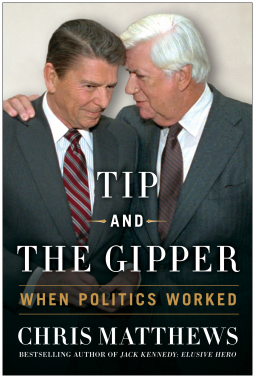
Tip and the Gipper
When Politics Worked
by Chris Matthews
This title was previously available on NetGalley and is now archived.
Buy on Amazon
Buy on BN.com
Buy on Bookshop.org
*This page contains affiliate links, so we may earn a small commission when you make a purchase through links on our site at no additional cost to you.
Send NetGalley books directly to your Kindle or Kindle app
1
To read on a Kindle or Kindle app, please add kindle@netgalley.com as an approved email address to receive files in your Amazon account. Click here for step-by-step instructions.
2
Also find your Kindle email address within your Amazon account, and enter it here.
Pub Date Oct 01 2013 | Archive Date Oct 01 2013
Description
TIP AND THE GIPPER is a magnificent personal history of a time when two great political opponents served together for the benefit of the country. Chris Matthews was an eyewitness to this story as a top aide to Speaker of the House Tip O’Neill, who waged a principled war of political ideals with President Reagan from 1980 to 1986. Together, the two men forged compromises that shaped America’s future and became one of history’s most celebrated political pairings—the epitome of how ideological opposites can get things done.
When Ronald Reagan was elected to the presidency in a landslide victory over Jimmy Carter (for whom Matthews had worked as a speechwriter), Speaker O’Neill realized Americans had voted for a change. For the first time in his career, O’Neill also found himself thrust into the national spotlight as the highest-ranking leader of the Democratic Party—the most visible and respected challenger to President Reagan’s agenda of shrinking the government and lowering taxes.
At first, O’Neill doubted his ability to compete on the public stage with the charming Hollywood actor, whose polished speeches played well on TV, a medium O’Neill had never mastered. Over time, the burly Irishman learned how to fight the popular president on his key issues, relying on legislative craftiness, strong rhetoric, and even guerrilla theater. “An old dog can learn new tricks,” Tip told his staff. Of O’Neill, one of his colleagues said, “If Martians came into the House chamber, they’d know instantly who the leader was.”
Meanwhile, President Reagan proved to be a much more effective and savvy leader than his rivals had ever expected, achieving major legislative victories on taxes and the federal budget. Reagan and his allies knew how to work the levers of power in Washington. After showing remarkable personal fortitude in the wake of the assassination attempt against him, Reagan never let his political differences with Democrats become personal. He was fond of the veteran Speaker’s motto that political battles ended at 6 p.m. So when he would phone O’Neill, he would say, “Hello, Tip, is it after six o’clock?”
Together, the two leaders fought over the major issues of the day—welfare, taxes, covert military operations, and Social Security—but found their way to agreements that reformed taxes, saved Social Security, and achieved their common cause of bringing peace to Northern Ireland. O’Neill’s quiet behind-the-scenes support helped Reagan forge his historic Cold War–ending bond with Mikhail Gorbachev. They each won some and lost some, and through it all they maintained respect for each other’s positions and worked to advance the country rather than obstruct progress.
As Matthews notes, “There is more than one sort of heroic behavior, and they don’t all look the same.” Tip and the Gipper is the story of the kind of heroism we need today.
When Ronald Reagan was elected to the presidency in a landslide victory over Jimmy Carter (for whom Matthews had worked as a speechwriter), Speaker O’Neill realized Americans had voted for a change. For the first time in his career, O’Neill also found himself thrust into the national spotlight as the highest-ranking leader of the Democratic Party—the most visible and respected challenger to President Reagan’s agenda of shrinking the government and lowering taxes.
At first, O’Neill doubted his ability to compete on the public stage with the charming Hollywood actor, whose polished speeches played well on TV, a medium O’Neill had never mastered. Over time, the burly Irishman learned how to fight the popular president on his key issues, relying on legislative craftiness, strong rhetoric, and even guerrilla theater. “An old dog can learn new tricks,” Tip told his staff. Of O’Neill, one of his colleagues said, “If Martians came into the House chamber, they’d know instantly who the leader was.”
Meanwhile, President Reagan proved to be a much more effective and savvy leader than his rivals had ever expected, achieving major legislative victories on taxes and the federal budget. Reagan and his allies knew how to work the levers of power in Washington. After showing remarkable personal fortitude in the wake of the assassination attempt against him, Reagan never let his political differences with Democrats become personal. He was fond of the veteran Speaker’s motto that political battles ended at 6 p.m. So when he would phone O’Neill, he would say, “Hello, Tip, is it after six o’clock?”
Together, the two leaders fought over the major issues of the day—welfare, taxes, covert military operations, and Social Security—but found their way to agreements that reformed taxes, saved Social Security, and achieved their common cause of bringing peace to Northern Ireland. O’Neill’s quiet behind-the-scenes support helped Reagan forge his historic Cold War–ending bond with Mikhail Gorbachev. They each won some and lost some, and through it all they maintained respect for each other’s positions and worked to advance the country rather than obstruct progress.
As Matthews notes, “There is more than one sort of heroic behavior, and they don’t all look the same.” Tip and the Gipper is the story of the kind of heroism we need today.
Available Editions
| EDITION | Hardcover |
| ISBN | 9781451695991 |
| PRICE | $29.95 (USD) |



